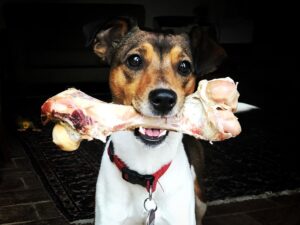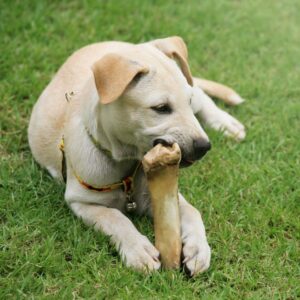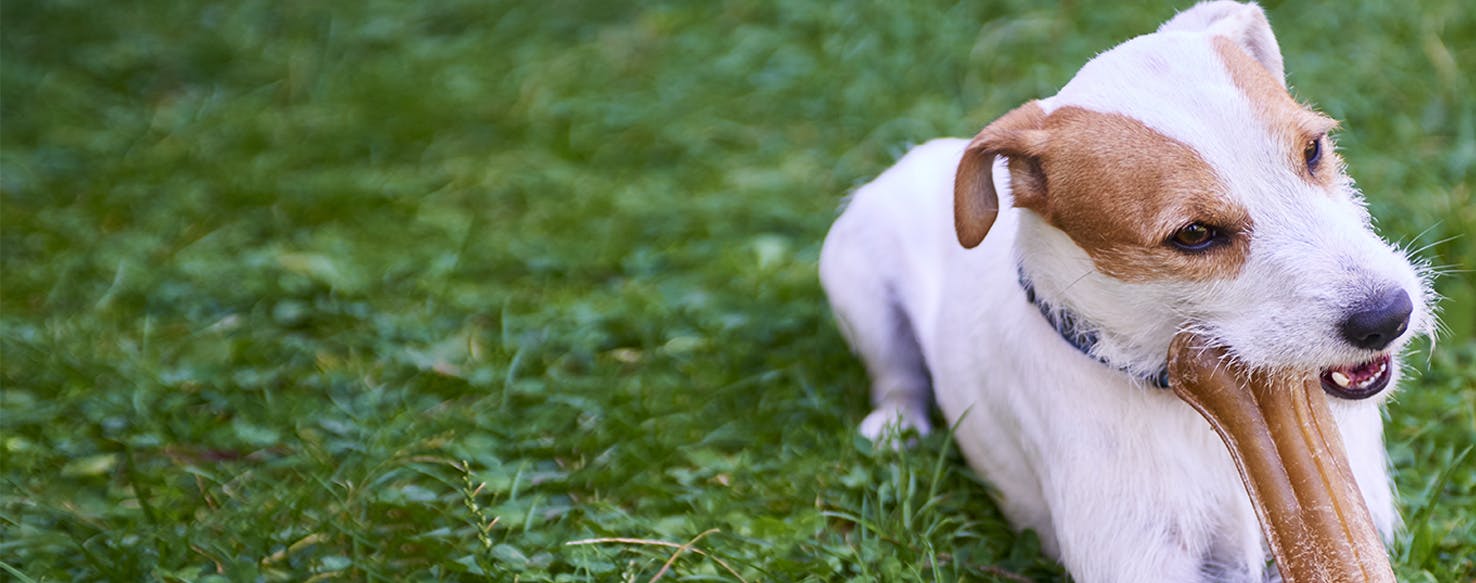Yes dogs do eat bones but it’s important to note that not all bones are safe them to consume. dogs have a natural instinct to chew and gnaw on bones which can provide them with several benefits. chewing on bones can help remove plaque and tartar from their teeth promoting healthy gums and teeth. gnawing on bones can be a calming and satisfying activity for dogs reducing stress and anxiety. bones contain protein calcium and other essential minerals that can supplement a dogs diet.

Introduction
Dogs have been chewing on bones for centuries and it’s a natural behavior that serves many purposes. but before we dive into the details let set the stage. dogs are descended from wolves and in the wild wolves don’t just hunt prey they also scavenge for carrion and chew on bones to survive. this innate behavior has been passed down through generation marking bone-chewing an instinctual activity for dogs. but it not just about satisfying a primal urge chewing on bones also provides numerous benefits for dogs. it help to reduce stress and anxiety exercises their jaw muscles and even supports dental health by scraping away plaque and tartar.
Can a dog digest a bone?
If your dog swallows a bone, stomach enzymes break it down immediately. Most of the time, it passes through the system entirely within about 8 to 12 hours. However, larger bones might take longer to break down. If you’re worried about your dog eating a bone they shouldn’t have, it’s safest to monitor them for two days.
Can dogs eat human bones?
Since some of the risks are very serious, we don’t advise feeding bones to your dog. One of the biggest risks is that sharp splinters of bone might damage your dog’s digestive tract. This can lead to a range of problems, including: Tongue or mouth injuries.
What if my dog eats a bone?
Symptoms such as choking, vomiting, and diarrhea can be life threatening. If your pup begins to have any symptoms or they are a puppy, seek veterinary attention immediately. If your dog is active, is eating well and seems completely normal, it’s generally safe to simply monitor the situation.
Why do dogs lick you?
Licking is a natural and instinctive behavior to dogs. For them it’s a way of grooming, bonding, and expressing themselves. Your dog may lick you to say they love you, to get your attention, to help soothe themselves if they’re stressed, to show empathy or because you taste good to them.
Can puppies chew bones?
Keep in mind to avoid bones at first, as your puppy’s teeth won’t yet be fully developed, and hard bones can cause damage. Their teeth are also exceptionally sharp at this stage, making it easier for them to break off larger chunks than they can handle in their hurry to enjoy their new, tasty treats.
Can a dog break a human bone?
Many dogs have very strong jaws that can exert a bite force that imposes several hundred pounds of pressure. Thus, the force alone of many bites is sufficient to fracture or crush a bone. Fractures can also occur when a person trips or falls attempting to flee from an attacking dog.
Are bones good for dogs teeth?
The short answer is no dogs cannot eat chicken bones. This is because they are soft and become brittle when cooked. So as your dog chews on the bone it can break and splinter in their throat, puncture their gastrointestinal tract, or cause them to choke.
Do dogs actually digest bones?
“While a dog’s stomach acid is able to digest boney substances, if a dog eats a large amount of thick bones, that can be hard to digest,” Dr. Tu said. That’s why, to be safe, you should always call your veterinarian if your pup swallows a bone, whether it’s an accident or not.
Is it OK if dogs eat bones?
Some veterinarians suggest raw meat bones for dogs. But raw meat bones may carry bacteria like salmonella. And bones that are too hard, even raw bones, could damage your dog’s teeth. If a bone is harder than a tooth, the tooth can fracture and your dog will need an expensive dental evaluation and treatment.
Can dogs eat chicken bones?
Chicken bones are dangerous to dogs because they are so small and can splinter so easily. These lightweight bones break into shards that can tear the throat or puncture through the intestines. The bones and their pieces can also quickly lead to choking and airway obstruction in dogs.
What if my dog eats a bone?
Symptoms such as choking, vomiting, and diarrhea can be life threatening. If your pup begins to have any symptoms or they are a puppy, seek veterinary attention immediately. If your dog is active, is eating well and seems completely normal, it’s generally safe to simply monitor the situation.
Is rice good for dogs?
Yes, dogs can eat white rice. Although lower in nutritional value than brown rice, white varieties of rice can be included in a dog’s diet. Since it’s fairly bland, vets often recommend white rice for dogs with an upset stomach.
Can dogs drink milk?
Milk is a safe treat in small quantities. A few tablespoons of cow’s milk or goat’s milk on an occasional basis can be a nice reward for your dog. But, you should probably hold off on offering your dog an entire bowl in one sitting, as it can cause unpleasant reactions, including diarrhea, vomiting, and loose stools.
Can dogs eat bones?
Raw bones are considered a “safe” bone option, but there are still risks. Your dog can still break a tooth, cut his or her gums, or get a bone splinter. Excessive chewing on the bone can cause constipation. The bone should be refrigerated before use and discarded after a few hours.
Conclusion
Dogs have an innate instinct to chew on bones which provides numerous benefits for their physical and mental well-being. bones serve as a natural source of essential nutrients help maintain dental health and provide mental stimulation and satisfaction. however it’s crucial to choose the right type and size of bones like beef or pork femur bones knuckle bones or marrow bones are ideal while cooked small or fragile bones can be harmful. introducing bones gradually and supervising your dog while they chew is vital to prevent choking or digestive issues.



